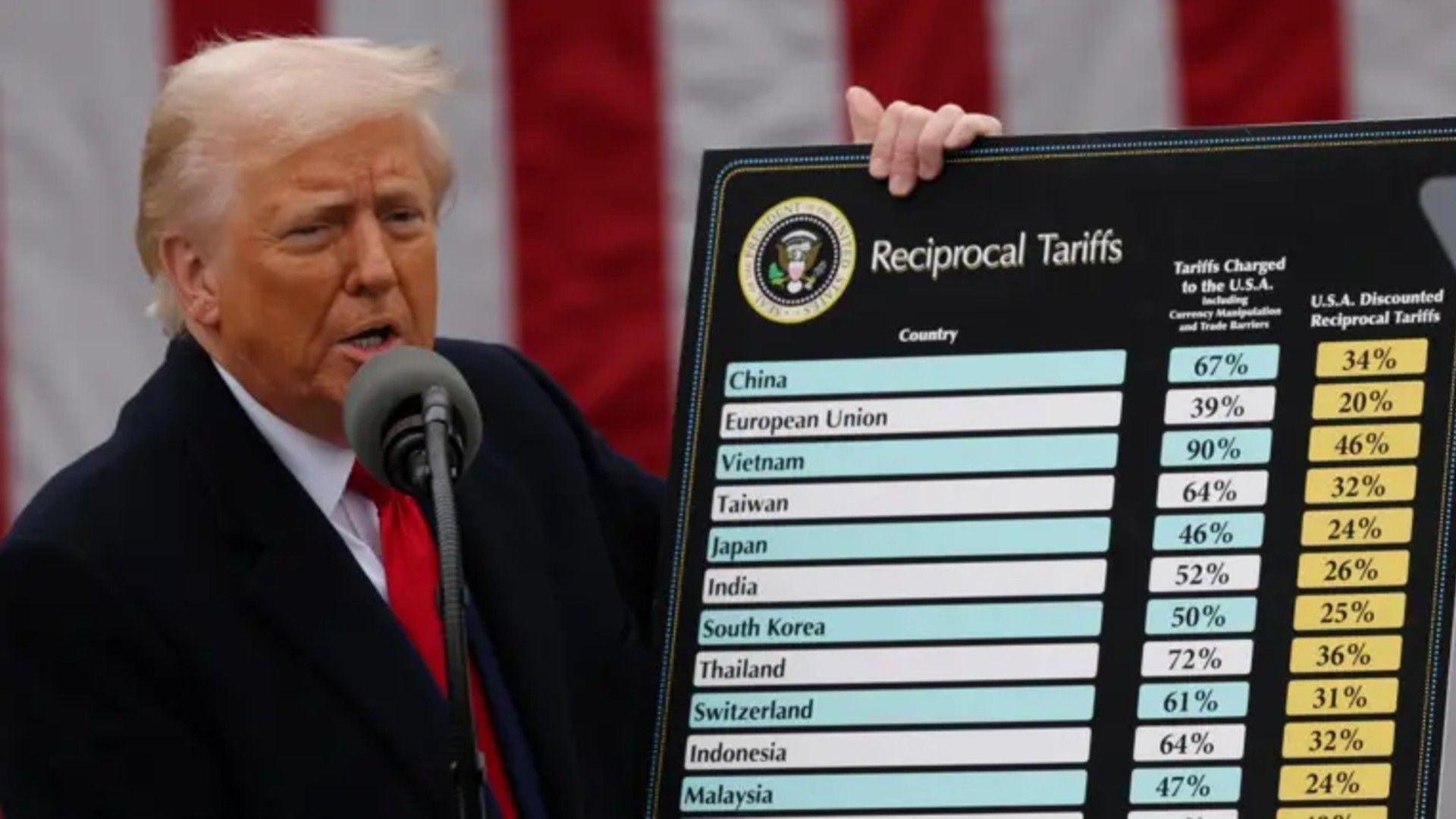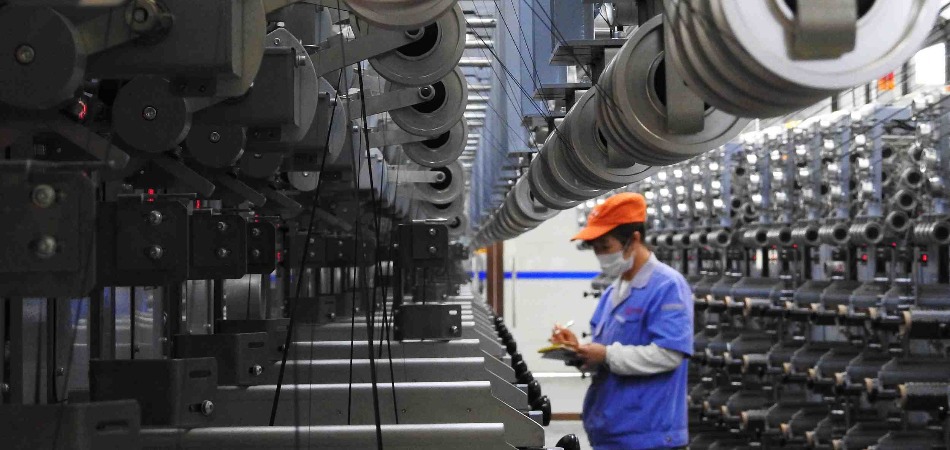Trump’s tariff ‘Chart of Death’ has Wall Street facing harsh reality

By MG News | April 07, 2025 at 03:14 PM GMT+05:00
April 07, 2025 (MLN): The American investor class — that top 10% that owns almost all of the stocks — is quickly coming to terms with its new, much-diminished status in the era of Donald Trump’s trade offensive.
From the corporate executives counting their stock options to the billionaire hedge-fund moguls and everyone in between, they’re merely collateral damage now.
The market crash Trump stoked last week was one for the history books. The Nasdaq 100 plunged into a bear market. More than $5 trillion was wiped off the value of all US shares in two days.
Commodities collapsed, and corporate-bond investors frantically bought insurance contracts that shielded them from default, according to Bloomberg.
Most of the pain came right after Trump unveiled a tariff plan so aggressive that few thought it possible, with levies of up to 50% on dozens of countries in a move he argues is crucial to ensuring long-term US prosperity.
That it all happened at the behest of a man who held sacred the Dow Jones Industrial Average as a benchmark of his popularity in his first stint in the White House prompted disbelief in financial circles across the country. Why is this happening? What is he doing?
“I've learned to cope with stress over the years,” says Richard Steinberg, “but at 4 o’clock in the morning, I'm up awake thinking about these things.”
At Focus Partners Wealth in Boca Raton, where Steinberg is a senior wealth adviser, the calls from worried clients keep coming, he says.
He tries to calm them down but acknowledges he himself is frustrated — “very frustrated” — by Trump’s approach. “It lacks a level of sophistication.”
Over in midtown Manhattan, Jay Hatfield, the CEO of Infrastructure Capital Advisors, was feeling much the same, just with a large dose of anger mixed in.
“This is unambiguously stupid.” He calls the big tariff chart that Trump brandished at the ceremony that day “the chart of death,” and when he saw it, he told himself to check his anger and just focus on unloading risky assets.
By the end of Friday, he had cut about 40% of them from the mutual funds he manages.
US President Donald Trump holds a tariff poster during a tariff announcement in the Rose Garden of the White House on April 2.
Whatever Trump’s end game is — whether it’s to make America wealthy again, create enough chaos to unlock a frozen housing market, or simply a political calculation that a bloated stock market owned mainly by the rich could stand pruning — one thing is certain three months into his second term:
Wall Street’s heralded status as a primary constituency of modern presidents is under assault.
“It’s a five-alarm fire,” Hatfield says. “There's no argument for creating a trade war whatsoever.”
Trump himself says he’s unfazed by the tumult, evoking past claims that market tremors are necessary to deliver justice to global commerce and to the down-and-out workers of Rust Belt America, the people most responsible for putting him back in the White House.
In private, he’s been expressing the same stay-the-course mantra he’s been stating publicly, according to an official familiar with the matter.
Trump’s also becoming increasingly focused on assets other than equities: 10-year Treasuries, which set interest rates for home buyers, and oil, which determines prices at the pump.
And as stocks cratered, both bond rates and oil prices sank.
Cheering on those declines may look silly in hindsight — after all, rates and oil are falling out of fear that tariffs will tip the economy into recession and send the jobless rate soaring — and yet Trump was quick to note how pleased he was with those drops when fielding questions about the market rout on Thursday.
The next morning, as the S&P 500 began to tumble again, Trump rolled up to his West Palm Beach golf course, where he’d spend much of the day.
If others in his administration were bothered by the meltdown in markets, they didn’t show it either.
“In a long-term chart, you wouldn’t even notice” the recent market declines, Treasury Secretary Scott Bessent said in an interview with Tucker Carlson, released on Friday.
“What’s happening with the market, I’d say it’s more a Mag-7 problem” — referring to the popular cohort of large stocks — “and not a MAGA problem.”
And he was dismissive of all the chatter about an economic downturn, telling NBC’s Meet the Press on Sunday that he sees “no reason that we have to price in a recession.”
Copyright Mettis Link News
Related News
| Name | Price/Vol | %Chg/NChg |
|---|---|---|
| KSE100 | 128,199.43 336.91M |
2.05% 2572.11 |
| ALLSHR | 79,787.62 1,023.63M |
1.53% 1202.91 |
| KSE30 | 39,105.00 121.90M |
2.49% 951.21 |
| KMI30 | 186,915.61 131.16M |
1.10% 2029.11 |
| KMIALLSHR | 54,201.88 553.60M |
0.81% 438.07 |
| BKTi | 33,476.68 51.49M |
4.87% 1555.00 |
| OGTi | 27,962.58 9.77M |
0.68% 188.60 |
| Symbol | Bid/Ask | High/Low |
|---|
| Name | Last | High/Low | Chg/%Chg |
|---|---|---|---|
| BITCOIN FUTURES | 105,755.00 | 108,105.00 105,695.00 |
-2480.00 -2.29% |
| BRENT CRUDE | 67.35 | 67.50 66.34 |
0.61 0.91% |
| RICHARDS BAY COAL MONTHLY | 97.50 | 97.50 97.50 |
0.70 0.72% |
| ROTTERDAM COAL MONTHLY | 103.80 | 103.80 103.80 |
-3.45 -3.22% |
| USD RBD PALM OLEIN | 998.50 | 998.50 998.50 |
0.00 0.00% |
| CRUDE OIL - WTI | 65.68 | 65.98 64.67 |
0.57 0.88% |
| SUGAR #11 WORLD | 15.70 | 16.21 15.55 |
-0.50 -3.09% |
Chart of the Day
Latest News
Top 5 things to watch in this week
Pakistan Stock Movers
| Name | Last | Chg/%Chg |
|---|
| Name | Last | Chg/%Chg |
|---|



.jpg)
 CPI
CPI